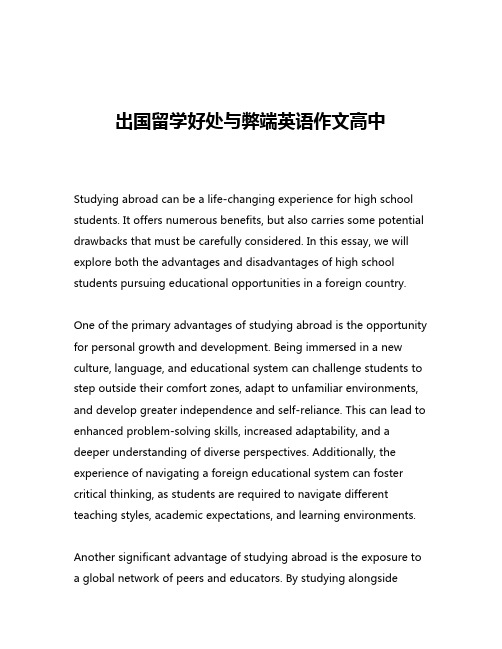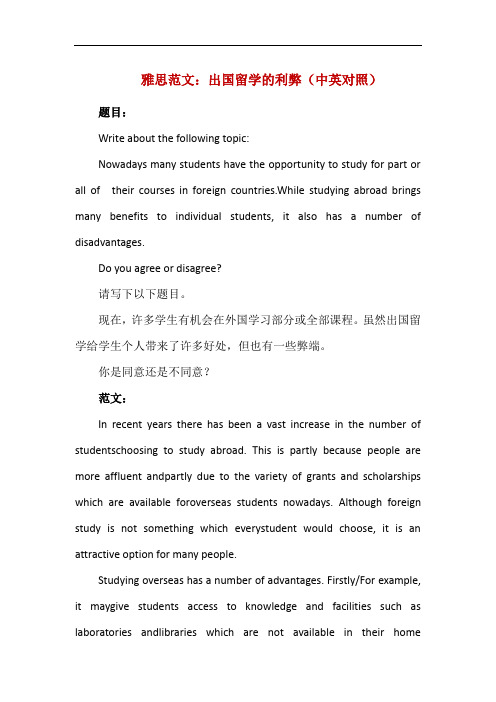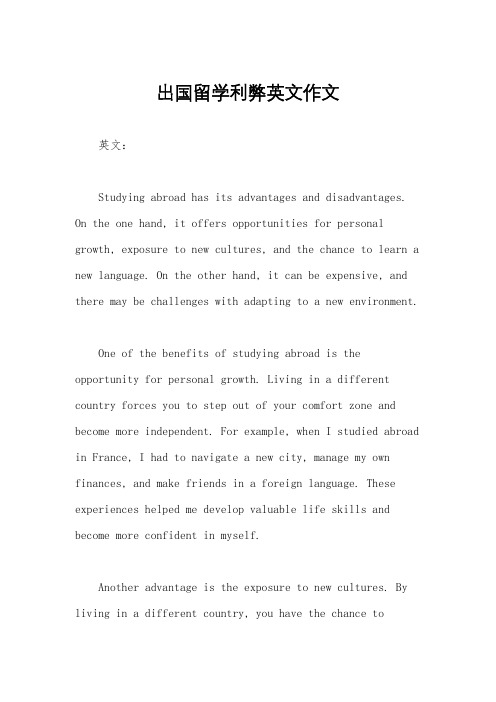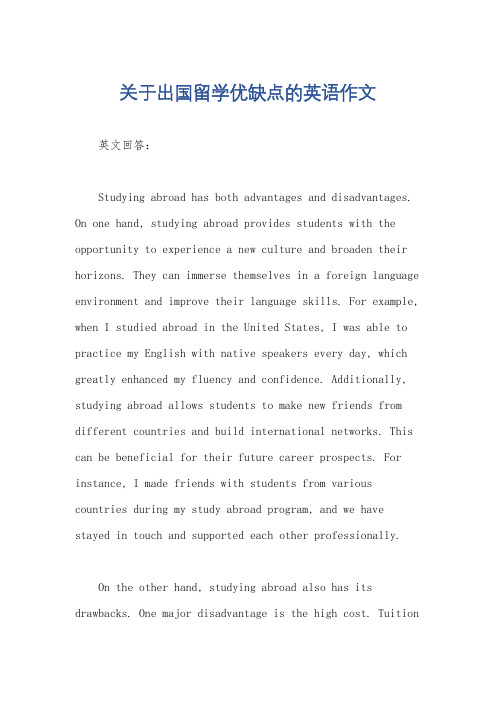出国留学的利弊分析高中英语作文_英语作文
出国留学的利与弊英语作文

出国留学的利与弊英语作文英文回答:Advantages of Studying Abroad。
Studying abroad can be an incredibly transformative experience, offering a myriad of benefits that can profoundly impact an individual's personal and professional growth. Here are some notable advantages:Expanded worldview and cultural awareness: immersing oneself in a foreign culture broadens one's perspective, fostering an appreciation for diverse values, customs, and traditions. It challenges preconceived notions and encourages a deeper understanding of global issues.Enhanced communication skills: living and studying in a country where the native language is different forces one to adapt and improve their linguistic abilities. This not only strengthens their command of the target language butalso sharpens their communication skills overall.Independence and self-reliance: leaving the familiar comforts of home and navigating a new environment fosters independence and self-reliance. Students learn to adapt to unfamiliar situations, manage their finances, and take on new responsibilities.Academic enrichment: studying at a foreign university exposes students to different academic perspectives, teaching methodologies, and research opportunities. This exposure enriches their intellectual development and provides a broader educational foundation.Career advancement: a degree from a foreign university can give graduates an edge in the competitive job market.It demonstrates a global mindset, intercultural competence, and the ability to thrive in diverse environments.Disadvantages of Studying Abroad。
出国留学好处与弊端英语作文高中

出国留学好处与弊端英语作文高中Studying abroad can be a life-changing experience for high school students. It offers numerous benefits, but also carries some potential drawbacks that must be carefully considered. In this essay, we will explore both the advantages and disadvantages of high school students pursuing educational opportunities in a foreign country.One of the primary advantages of studying abroad is the opportunity for personal growth and development. Being immersed in a new culture, language, and educational system can challenge students to step outside their comfort zones, adapt to unfamiliar environments, and develop greater independence and self-reliance. This can lead to enhanced problem-solving skills, increased adaptability, and a deeper understanding of diverse perspectives. Additionally, the experience of navigating a foreign educational system can foster critical thinking, as students are required to navigate different teaching styles, academic expectations, and learning environments.Another significant advantage of studying abroad is the exposure to a global network of peers and educators. By studying alongsidestudents from various cultural backgrounds, high school students can develop valuable intercultural communication skills, learn to collaborate with individuals from diverse perspectives, and build a network of international connections that can prove invaluable in their future academic and professional pursuits. This global exposure can also broaden students' horizons, encouraging them to consider international career paths and fostering a deeper appreciation for cultural differences.Furthermore, studying abroad can provide high school students with unique educational opportunities that may not be available in their home countries. Access to specialized programs, state-of-the-art facilities, or renowned institutions can offer students a competitive edge in their academic and professional development. This can be particularly beneficial for students interested in pursuing fields with a strong international focus, such as international relations, global business, or language studies.However, studying abroad also presents potential challenges and drawbacks that must be carefully considered. One of the primary concerns is the financial burden associated with studying in a foreign country. Tuition fees, living expenses, and travel costs can be significantly higher than those incurred in a student's home country, which can create financial strain for both the student and their family. This financial barrier can limit access to study abroad opportunities,potentially excluding students from lower-income backgrounds.Homesickness and cultural adjustment can also be significant challenges for high school students studying abroad. Adapting to a new educational system, social norms, and language can be overwhelming, and the distance from family and friends can lead to feelings of isolation and loneliness. This adjustment period can be particularly difficult for younger students who may not have had extensive experience living independently or navigating unfamiliar environments.Additionally, the disruption to a student's educational continuity can be a concern. Transferring credits, navigating different academic calendars, and adapting to new teaching methodologies can create challenges in ensuring a seamless transition back to the home educational system. This can potentially impact a student's academic progress and delay their graduation or post-secondary plans.Another potential drawback of studying abroad for high school students is the risk of cultural immersion leading to the loss of one's own cultural identity. While exposure to diverse cultures can be enriching, there is a concern that students may become too assimilated into the host culture, potentially leading to a disconnect from their own cultural heritage and values. This can create challenges in maintaining a strong sense of personal identity andbelonging upon returning to their home country.Despite these potential drawbacks, the overall benefits of studying abroad for high school students often outweigh the challenges. The personal growth, global exposure, and unique educational opportunities can have a lasting impact on a student's academic, personal, and professional development. However, it is crucial for students and their families to carefully research and plan for the financial, emotional, and academic implications of studying abroad to ensure a successful and rewarding experience.In conclusion, studying abroad can be a transformative experience for high school students, offering opportunities for personal growth, global exposure, and access to unique educational opportunities. While there are potential drawbacks, such as financial burdens, cultural adjustment challenges, and disruptions to educational continuity, the benefits of studying abroad often outweigh the risks. By carefully considering both the advantages and disadvantages, high school students and their families can make an informed decision about the viability and feasibility of pursuing educational opportunities in a foreign country.。
出国留学的好处和缺点英语作文

出国留学的好处和缺点英语作文Benefits and drawbacks of studying abroad.Studying abroad is a life-changing experience that can provide students with a wealth of benefits. However, it is important to also be aware of the potential drawbacks before making a decision.Benefits.There are many benefits to studying abroad, including:1. Personal growth: Studying abroad can help students to develop a greater sense of independence and self-reliance. They will be forced to step outside of their comfort zone and learn how to navigate a new culture and language. This experience can be incredibly empowering and can help students to grow as individuals.2. Academic enrichment: Studying abroad can providestudents with the opportunity to learn about different academic subjects in a new and exciting way. They will be exposed to new perspectives and ideas, and they will have the opportunity to learn from world-renowned experts in their field.3. Career advancement: Studying abroad can give students a competitive edge in the job market. Employers value employees who have international experience and who are able to think critically and solve problems in a global context.4. Cultural immersion: Studying abroad allows students to experience a new culture firsthand. They will learn about the local customs and traditions, and they will have the opportunity to make friends from all over the world. This experience can be incredibly enriching and can help students to develop a greater understanding of the world.Drawbacks.While there are many benefits to studying abroad,there are also some potential drawbacks to consider:1. Cost: Studying abroad can be expensive. Studentswill need to pay for tuition, housing, food, and transportation. They may also need to pay for a visa and health insurance.2. Homesickness: Studying abroad can be a lonely experience. Students may miss their family and friends, and they may feel overwhelmed by the challenges of living in a new country.3. Culture shock: Culture shock is a common experience for students who study abroad. They may find that the local customs and traditions are very different from their own, and they may have difficulty adjusting to the new environment.4. Language barriers: Students who study abroad in a country where they do not speak the local language may have difficulty communicating with their classmates and professors. This can make it difficult to succeedacademically and to make friends.Overall, studying abroad can be a rewarding and life-changing experience. However, it is important to weigh the benefits and drawbacks carefully before making a decision.中文回答:出国留学的利与弊。
雅思范文:出国留学的利弊(中英对照)

雅思范文:出国留学的利弊(中英对照)题目:Write about the following topic:Nowadays many students have the opportunity to study for part or all of their courses in foreign countries.While studying abroad brings many benefits to individual students, it also has a number of disadvantages.Do you agree or disagree?请写下以下题目。
现在,许多学生有机会在外国学习部分或全部课程。
虽然出国留学给学生个人带来了许多好处,但也有一些弊端。
你是同意还是不同意?范文:In recent years there has been a vast increase in the number of studentschoosing to study abroad. This is partly because people are more affluent andpartly due to the variety of grants and scholarships which are available foroverseas students nowadays. Although foreign study is not something which everystudent would choose, it is an attractive option for many people.Studying overseas has a number of advantages. Firstly/For example, it maygive students access to knowledge and facilities such as laboratories andlibraries which are not available in their homecountry.Furthermore/Moreover/What is more/Secondly, by looking abroad students may finda wider range of courses than those offered in their country’s universities, andtherefore one which fits more closely to their particular requirements.On the other hand, studying abroad has a number of drawbacks. These may bedivided into personal and professional. Firstly students have to leave theirfamily and friends for a long period. Furthermore/Moreover/What is more/Secondlystudying abroad is almost always more expensive that studying in one’s localuniversity. Finally/Furthermore/Moreover/What is more, students often have tostudy in a foreign language, which may limit their performance and mean they donot attain their true level.In my opinion/On the other hand, however, the disadvantages of studyingabroad are usually temporary in nature. Students who study abroad generallybecome proficient in the language quite soon and they are only away from theirfamily and friends for a year or two. Furthermore/What is more, many of thebenefits last students all their lives and make them highly desirable toprospective employers.译文:近年来,选择出国留学的学生人数大幅增加。
出国留学利弊英文作文

出国留学利弊英文作文英文:Studying abroad has its advantages and disadvantages. On the one hand, it offers opportunities for personal growth, exposure to new cultures, and the chance to learn a new language. On the other hand, it can be expensive, and there may be challenges with adapting to a new environment.One of the benefits of studying abroad is the opportunity for personal growth. Living in a different country forces you to step out of your comfort zone and become more independent. For example, when I studied abroad in France, I had to navigate a new city, manage my own finances, and make friends in a foreign language. These experiences helped me develop valuable life skills and become more confident in myself.Another advantage is the exposure to new cultures. By living in a different country, you have the chance toimmerse yourself in a new way of life and gain a deeper understanding of the world. For instance, during my time in Japan, I was able to participate in traditional tea ceremonies, visit ancient temples, and learn about the customs and traditions of the Japanese people. These experiences broadened my perspective and enriched my lifein ways that would not have been possible if I had stayedin my home country.However, studying abroad also has its drawbacks. One of the main disadvantages is the cost. Tuition, living expenses, and travel can add up to a significant financial burden. Additionally, there may be unexpected expenses, such as medical emergencies or visa issues, that canfurther strain your budget. When I studied in Australia, I had to carefully budget my money and make sacrifices in order to afford my living expenses. It was a challenging experience that taught me the value of financial responsibility.Another downside is the challenge of adapting to a new environment. Language barriers, cultural differences, andhomesickness can make the adjustment period difficult. For example, when I first arrived in Germany, I struggled to communicate with locals and felt isolated from my friends and family back home. It took time and effort to overcome these obstacles and feel at home in my new surroundings.In conclusion, studying abroad has both advantages and disadvantages. It offers opportunities for personal growth and cultural enrichment, but it can also be expensive and challenging. Despite the drawbacks, the experience of studying abroad is invaluable and has the potential to positively impact your life in countless ways.中文:出国留学有其利与弊。
外出留学的好处和坏处英语作文

外出留学的好处和坏处英语作文Studying abroad has both its advantages and disadvantages. On the one hand, it can broaden one's horizons and provide valuable international experience. On the other hand, it can be financially challenging and may also lead to feelings of homesickness.One of the main benefits of studying abroad is the opportunity to immerse oneself in a different culture and language. This can lead to personal growth and a better understanding of the world. Additionally, studying abroad often provides access to high-quality education and can enhance one's career prospects.However, there are also drawbacks to studying abroad. Financially, it can be a significant burden, as tuitionfees and living expenses can be quite high. Furthermore, being away from family and friends for an extended periodof time can lead to homesickness and feelings of isolation.Overall, studying abroad can be a rewarding experience, but it is important to carefully consider both the pros andcons before making the decision to pursue an education in a foreign country.留学的好处和坏处各有其优缺点。
出国留学的好处和坏处英语作文

出国留学的好处和坏处英语作文Going abroad to study has both advantages and disadvantages. On one hand, studying abroad can broaden our horizons and expose us to different cultures. We can learn firsthand about the customs, traditions, and lifestyles of people from other countries. This exposure can help us become more open-minded and tolerant, as we learn to appreciate and respect the diversity of the world.On the other hand, studying abroad can be challenging. We might face language barriers, cultural shock, and homesickness. It can be difficult to adapt to a new environment, make new friends, and navigate through unfamiliar systems. However, these challenges can also be seen as opportunities for personal growth. By overcoming these obstacles, we become more resilient, independent, and self-reliant.Another advantage of studying abroad is the opportunity to receive a quality education. Many countries haveprestigious universities and colleges that offer excellent academic programs. By studying in these institutions, we can gain access to world-class education and enhance our knowledge and skills. This can greatly benefit our future career prospects and increase our competitiveness in the global job market.However, studying abroad can also be expensive. Tuition fees, living expenses, and travel costs can add up quickly. Financial constraints can limit our options and make it difficult to fully enjoy the experience. Moreover, beingfar away from family and friends can be emotionally challenging. We might miss important events and milestones in their lives, and feel disconnected from our support system.Despite the challenges and disadvantages, studying abroad can be a life-changing experience. It allows us to step out of our comfort zone, gain independence, and develop a global perspective. It offers opportunities for personal and academic growth, and helps us build a network of international connections. Overall, studying abroad canbe a transformative journey that shapes our character and prepares us for a successful future.。
关于出国留学优缺点的英语作文

关于出国留学优缺点的英语作文英文回答:Studying abroad has both advantages and disadvantages. On one hand, studying abroad provides students with the opportunity to experience a new culture and broaden their horizons. They can immerse themselves in a foreign language environment and improve their language skills. For example, when I studied abroad in the United States, I was able to practice my English with native speakers every day, which greatly enhanced my fluency and confidence. Additionally, studying abroad allows students to make new friends from different countries and build international networks. This can be beneficial for their future career prospects. For instance, I made friends with students from various countries during my study abroad program, and we have stayed in touch and supported each other professionally.On the other hand, studying abroad also has its drawbacks. One major disadvantage is the high cost. Tuitionfees, living expenses, and travel expenses can be quite expensive, and not all students can afford it. Moreover, studying abroad can be challenging for some students due to homesickness and cultural shock. Being away from family and familiar surroundings can be difficult, and adjusting to a new culture can be overwhelming. For example, when I first arrived in the United States, I felt homesick and struggled to adapt to the American way of life. It took some time for me to overcome these challenges and feel comfortable in my new environment.中文回答:出国留学有利有弊。
- 1、下载文档前请自行甄别文档内容的完整性,平台不提供额外的编辑、内容补充、找答案等附加服务。
- 2、"仅部分预览"的文档,不可在线预览部分如存在完整性等问题,可反馈申请退款(可完整预览的文档不适用该条件!)。
- 3、如文档侵犯您的权益,请联系客服反馈,我们会尽快为您处理(人工客服工作时间:9:00-18:30)。
出国留学的利弊分析高中英语作文
.写作作为英语教学的一个重点与难点一直为师生所关注。
但在
实际的英语学习过程中,一些学生将更多的时间投入到见效较快的词汇、英语阅读等部分,而忽略了英语写作问题。
近年来,越来越多人
选择出国留学。
那么,出国留学到底是好还是不好呢?下面是橙子为
你整理的几篇关于出国留学的利弊分析高中英语作文,希望你能喜欢!
出国留学的利弊分析高中英语作文篇1
Recent years, more and more Chinese people have chosen to study abroad. To this tendency, some people think it is not good, as most of the overseas learners do not come back, whereas I hold a different opinion.
In my opinion, it is a good thing that more Chinese people go abroad. There are three reasons. First, the overseas learners can improve their ability through the study. They can grasp advanced technologies and their language ability can be improved as well. Second, with the rapid development of China, more and more overseas learners will choose come back, using their abundant knowledge studied abroad to serve for the motherland. The third, the government and most domestic enterprises are willing to provide favorable treatments to 1 / 3
attract them to come back.
Although some do not want to come home, we are glad to see that there are more overseas learners chosen to work at home than before. For the above reasons, I think it is not a bad thing for more and more Chinese study abroad
出国留学的利弊分析高中英语作文篇2
Nowadays, many people like to study abroad. Studying abroad is often considered as a great opportunity which will lead to bright future in one's ride of passage. Not only can we learn different cultures and knowledge from foreign countries, studying abroad can also enrich our lives. But every coin has two sides. Likewise, different people have different minds. Disadvantages of studying abroad may affect one's life culturally and economically. Studying abroad can cost students a great deal of living expenses. Some Chinese students are so academically successful that they receive scholarships in their studies. However, most peers who study abroad do not receive scholarships. Furthermore, they have to deal with many unexpected hardships by living away from their parents and homeland. For example, medical insurance, daily foods, clothes, rents and transportation can generate a large amount of living 2 / 3
expenses. Often time, they need to heavily depend on their parents' overseas monthly payments.
出国留学的利弊分析高中英语作文篇3
Recent years, more and more Chinese people have chosen to study abroad. To this tendency, some people think it is not good, as most of the overseas learners do not come back, whereas I hold a different opinion.
In my opinion, it is a good thing that more Chinese people go abroad. There are three reasons. First, the overseas learners can improve their ability through the study. They can grasp advanced technologies and their language ability can be improved as well. Second, with the rapid development of China, more and more overseas learners will choose come back, using their abundant knowledge studied abroad to serve for the motherland. The third, the government and most domestic enterprises are willing to provide favorable treatments to attract them to come back.
For the above reasons, I think it is not a bad thing for more and more Chinese study abroad.
3 / 3。
